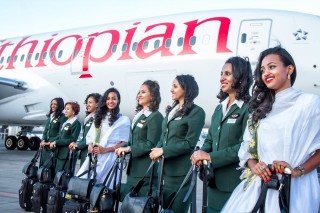In September, Nigeria’s Federal Minister of Aviation, Hadi Sirika, announced a consortium led by Ethiopian Airlines as the preferred bidder for shares in Nigeria Air, the national carrier the country seeks to revive. The mission happens to be one of President Muhammadu Buhari’s campaign promises and has been on the top burner for the president, who has barely 7 months in office.
According to Reuters, Sirika said that Ethiopian Airlines will own a 49 per cent stake in the new airline deal. Whereas, the Nigerian Sovereign Fund will take 46 per cent and the federal government will keep the remaining five per cent.
The minister added that Nigeria Air would have an initial capital of $300 million with plans to have 30 aircraft within four years. “We are going to bring in 6 Boeing 737 aircraft initially and between the third and fourth year the airline will be able to acquire up to 30 aircraft,” Sirika said.
For a country whose second attempt to own a national carrier (Virgin Nigeria) officially failed in September 2012, this ought to be great news. But that is not the case as stakeholders and airline operators fault the agreement as inadequate.
“Ultimately, I feel this is an exercise in futility. Creating an airline requires really long-term planning, and this initiative definitely falls short in that respect,” said an anonymous expert familiar with the matter.
While speaking with Ventures Africa, he noted that aircraft acquisition is the easiest part of this deal. However, it is saddled with other challenges like human capital development, the lack of a clear understanding of customers’ needs, poor engagement of other stakeholders (both internal and external), etc.
“Time is not in the government’s favour, and rest assured, Ethiopia Airlines is not doing this out of the kindness of their hearts. I feel it’s a needless trap and will lead to further embarrassment for Nigeria, as things will inevitably fall apart,” he added.
A few weeks have passed since the government approved this deal and there has been a lot of fuss by airline operators. Despite the clamour on the Nigerian aviation scene, the federal government is keeping up with the plan.
Recently, local news reported that the Aircraft Owners and Pilots Association of Nigeria (AOPAN) had rejected the deal. “We do not think this is the best thing. It is not genuine. We reject it. Nigeria Air will not suffer any fate different from what befell the defunct Virgin Nigeria that could not go to the United States. This is clear in the Bilateral Air Services Agreement regulations,” said Alex Nwuba, AOPAN President.
Defunct Virgin Nigeria came into commercial operations in 2004, the year after Nigeria Airways finally ceased operations. Virgin Nigeria was a partnership between the government of President Olusegun Obasanjo and Virgin Atlantic, owned by British billionaire, Richard Bradson.
He had made a similar deal with the then government. But, he later decried high levels of corruption among government officials, a hint to what led his business out of the country. A report quoted Brandon saying, “… We fought a daily battle against government agents who wanted to daily make fortune from us, politicians who saw the government 49 per cent as a meal to seek for all kinds of favour…watchdogs (regulatory body) that didn’t know what to do and persistently asking for bribes at any point…Nigerian people are generally nice but the politicians are very insane…that may be ironic because the people make up the politicians…”
Nigeria has not allowed foreign airlines operating in its airspace to repatriate their funds. This has led foreign airline operators to suspend operations or exit the country’s airspace. As of July ending, trapped funds of over 20 foreign airlines had risen above $600 million and stakeholders speculate that it could get to $1 billion by the year’s end. What’s in this deal for Ethiopia Airlines?








